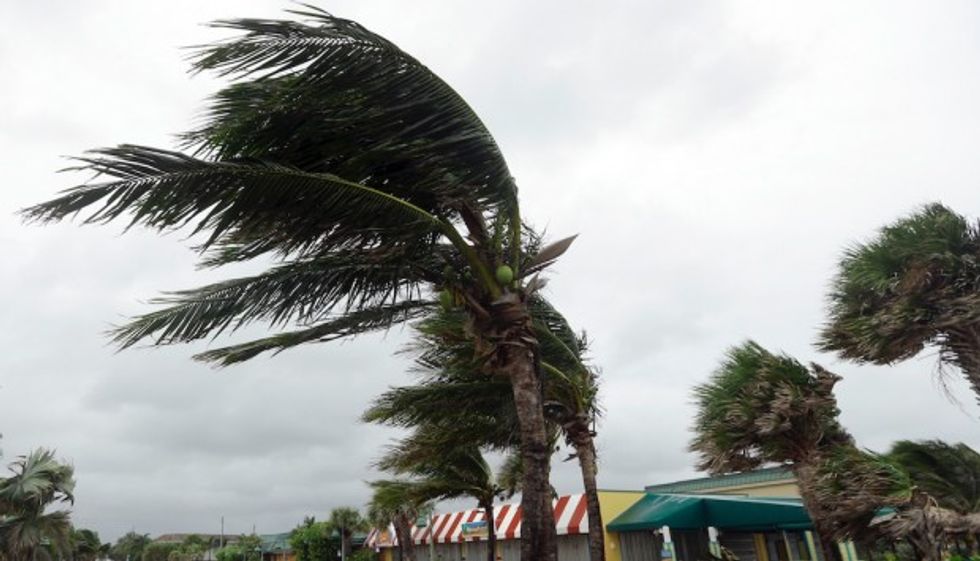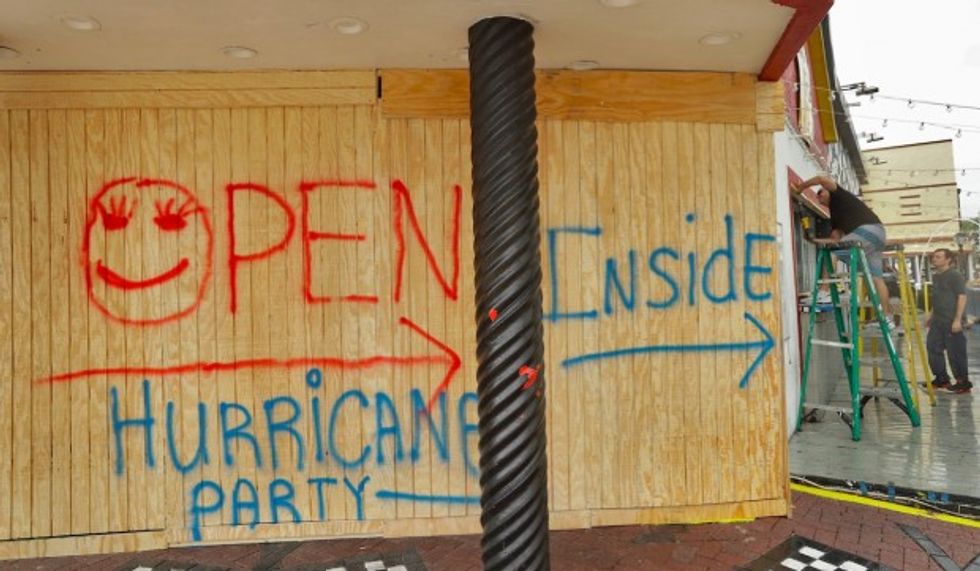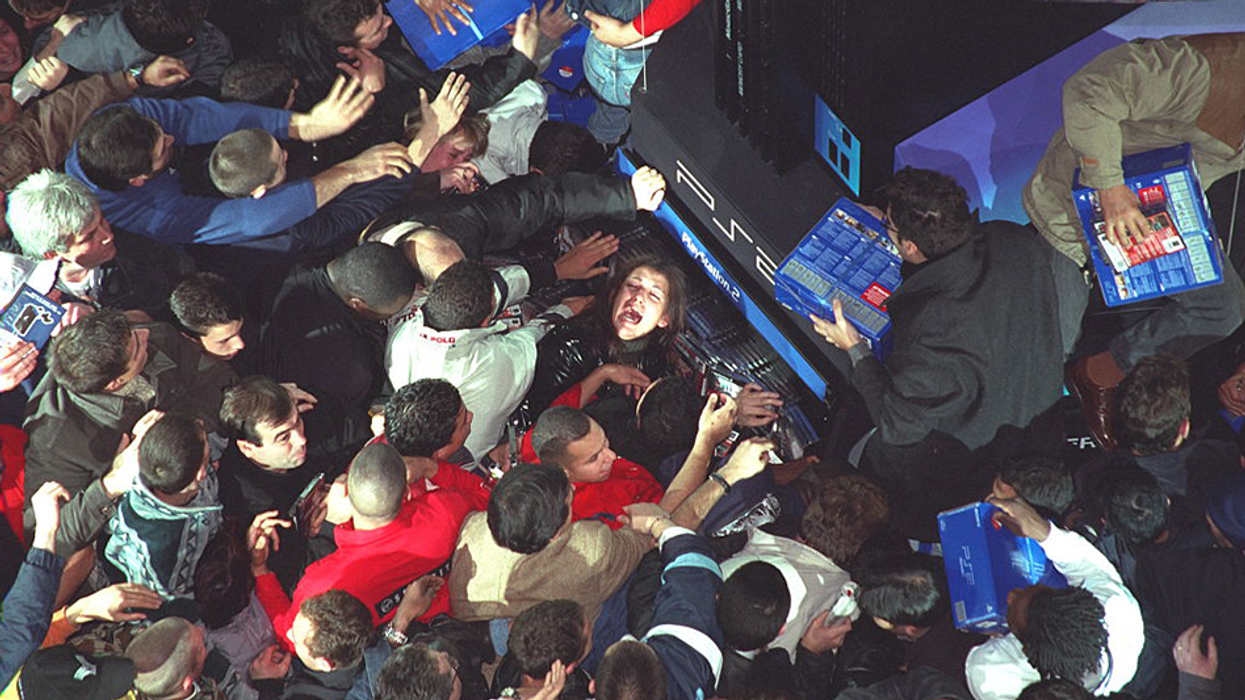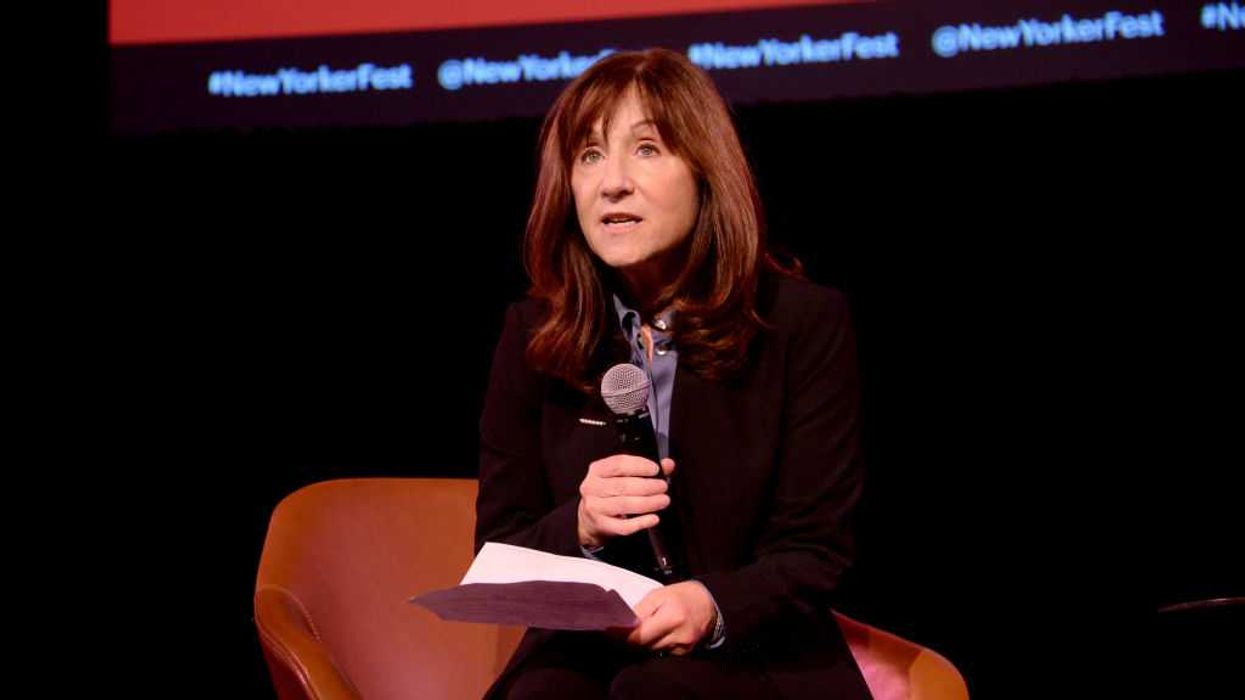
© 2025 Blaze Media LLC. All rights reserved.
One family called in that the roof “just flew off their home ..."
CAPE CANAVERAL, Fla. (AP) — Hurricane Matthew spun dangerously close to Florida's Atlantic coast Friday morning, scraping the shore with howling wind and heavy rain and that left more than 400,000 without power.
Matthew was downgraded to a Category 3 hurricane overnight with the strongest winds of 120 mph just offshore as the storm pushed north around dawn, threatening more than 500 miles of coastline in Florida, Georgia and South Carolina. A 107 mph gust was recorded in Cape Canaveral.

Two million people were warned to flee inland to escape a potentially catastrophic blow from a storm that left more than 280 dead in its wake across the Caribbean, but many hunkered down and hoped for the best despite dire warnings.
People who refused to evacuate from central Florida's Atlantic coast found themselves cut off and were calling for help as Matthew's western eyewall brushed past Cape Canaveral, officials said.
Brevard County Emergency Operations spokesman David Waters said he talked to families who said things like, "We're scared. We wish we hadn't stayed." One family called in that the roof "just flew off their home on Merritt Island," Waters said.
Robert Tyler had feared a storm surge flooding his street, which is only two blocks from the Cape Canaveral beach. But he and his wife, Georgette, felt fortunate Friday morning when they looked out the front door of their one-story cinder block apartment and there wasn't much water.
"Overnight, it was scary as heck. That description of a freight train is pretty accurate," he said.
In Cape Canaveral, John Long rode out the storm in his 32-foot camper in a park about half a mile from the beach.
He lost power shortly before dawn but quickly fired up his generator. Small tree branches battered the vehicle but the large ones on the park's giant oak trees didn't fall.
"It was kind of loud and kind of shaky but nothing that caused too much concern," he said.
Florida Gov. Rick Scott called it a "blessing" Friday morning that so far Florida was avoiding a direct hit as the storm sliced northward.
Still Scott stressed during a television appearance on "CBS This Morning" and NBC's "Today" show that there was still time for people living in the Jacksonville area to evacuate. The storm was expected to bring a large volume of water onshore and Scott noted there are a lot of low-lying areas in northeast Florida.
"There's no reason to be taking a risk," he said.
Moe than 1.5 million people in Florida were asked to evacuate ahead of Matthew, the first major hurricane storm to hit the state in 11 years.
The number of homes and businesses without power jumped by the hour as the storm edged closer to the coast. More than 420,000 were in the dark by Friday morning.
As of 7 a.m. EDT Friday, the hurricane was brushing Cape Canaveral, according to the National Hurricane Center. Matthew was centered about 35 miles east of Cape Canaveral and moving north-northwest around 14 mph.
After Florida, forecasters said Matthew would probably hug the coast of Georgia and South Carolina over the weekend before veering out to sea — perhaps even looping back toward Florida in the middle of next week as a tropical storm.
The hurricane had been a potentially catastrophic Category 4 storm, but weakened slightly early Friday to a Category 3. Forecasters said it could dump up to 15 inches of rain in some spots and cause a storm surge of 9 feet or more.
They said the major threat to the Southeast would not be the winds — which newer buildings can withstand — but the massive surge of seawater that could wash over coastal communities along a 500-mile stretch from South Florida to the Charleston, South Carolina, area.
President Barack Obama declared a state of emergency for Florida, Georgia and South Carolina, freeing up federal money and personnel to protect lives and property.
The Fort Lauderdale and Orlando airports shut down. Airlines canceled more than 3,000 flights Thursday and Friday, many of them in or out of Miami and Fort Lauderdale. Amtrak suspended train service between Miami and New York, and cruise lines rerouted ships to avoid the storm, which in some cases will mean more days at sea.

Orlando's world-famous theme parks — Walt Disney World, Universal Studios and SeaWorld — all closed.
"I never get time off. I'm a little sad," tourist Amber Klinkel, 25, of Battle Creek, Michigan, lamented at Universal.
Patients were transferred from two Florida waterfront hospitals and a nursing home near Daytona Beach to safer locations.
Thousands of people hunkered down in schools converted to shelters, and inland hotels in places such as Charlotte, North Carolina, reported brisk business.
At the Kennedy Space Center in Cape Canaveral, NASA no longer has to worry about rolling space shuttles back from the launch pad to the hangar because of hurricanes, since the shuttle fleet is now retired. But the spaceflight company SpaceX was concerned about the storm's effect on its leased seaside pad.
The last Category 3 storm or higher to hit the U.S. was Wilma in October 2005. It sliced across Florida with 120 mph winds, killing five people and causing an estimated $21 billion in damage.
With hurricane-force winds extending outward up to 60 miles, Matthew could wreak havoc along the U.S. coast even if its center stayed offshore.
Georgia Gov. Nathan Deal ordered an evacuation of the entire Georgia coast, covering more than a half-million people. It was the first hurricane evacuation along the Georgia coast since 1999, when the state narrowly escaped Floyd.
"We have a house that sits right here on the water and we kind of said goodbye to it thinking that, you know, the house ... might not be here when we get back," said Jennifer Banker, a resident of Georgia's dangerously exposed St. Simons Island. "You know, we pray a lot and trust God to provide."
Want to leave a tip?
We answer to you. Help keep our content free of advertisers and big tech censorship by leaving a tip today.
Want to join the conversation?
Already a subscriber?
Sr. Editor, News
Dave Urbanski is a senior editor for Blaze News.
DaveVUrbanski
more stories
Sign up for the Blaze newsletter
By signing up, you agree to our Privacy Policy and Terms of Use, and agree to receive content that may sometimes include advertisements. You may opt out at any time.
Related Content
© 2025 Blaze Media LLC. All rights reserved.
Get the stories that matter most delivered directly to your inbox.
By signing up, you agree to our Privacy Policy and Terms of Use, and agree to receive content that may sometimes include advertisements. You may opt out at any time.






